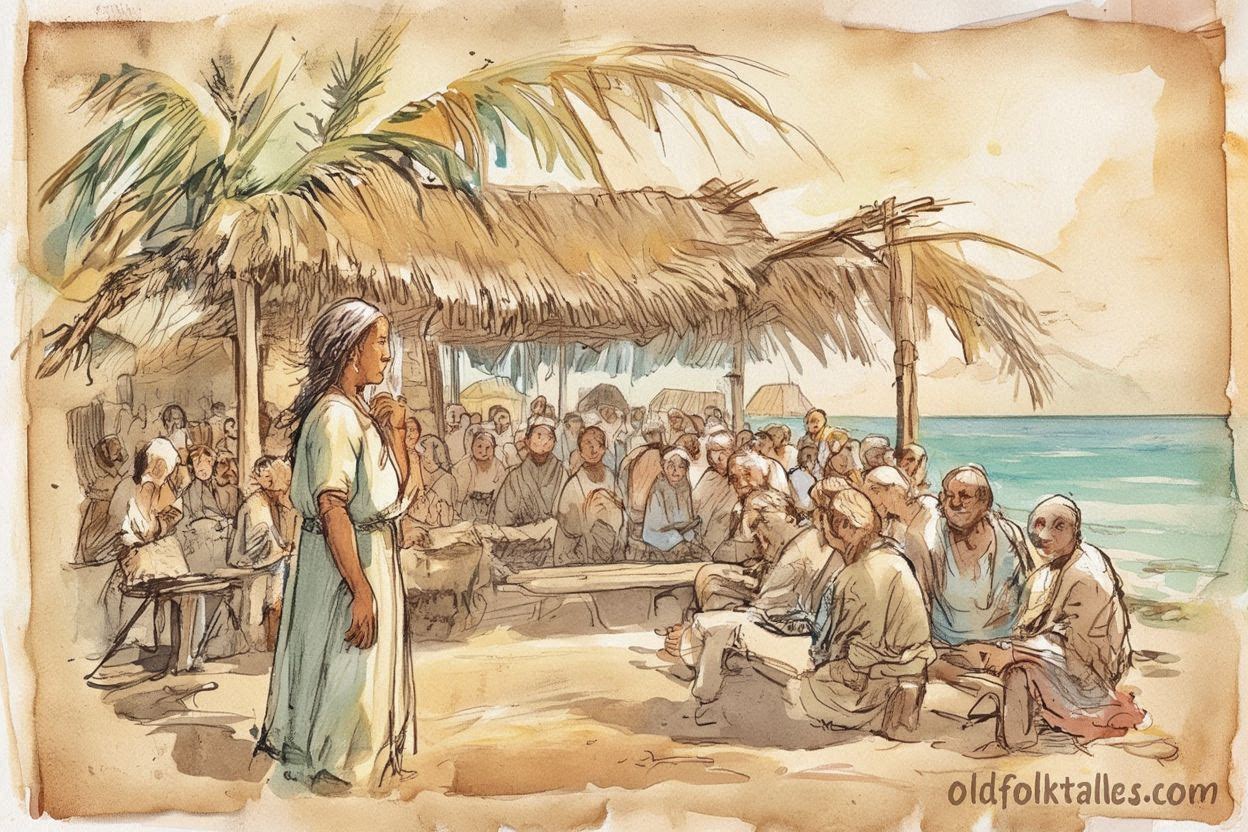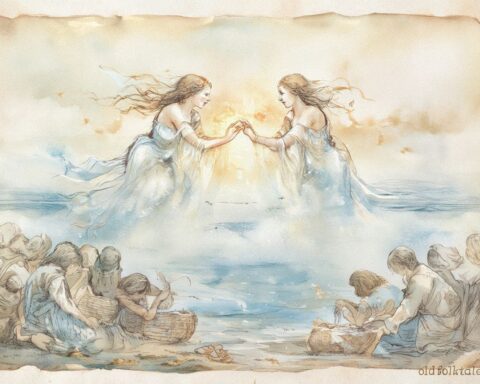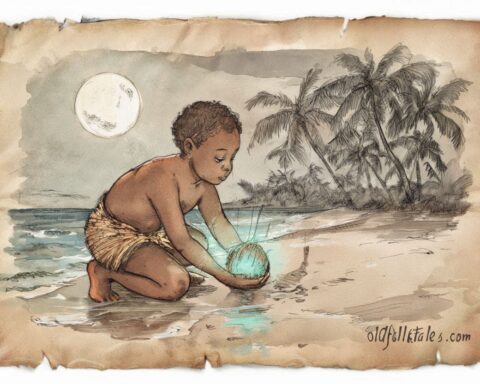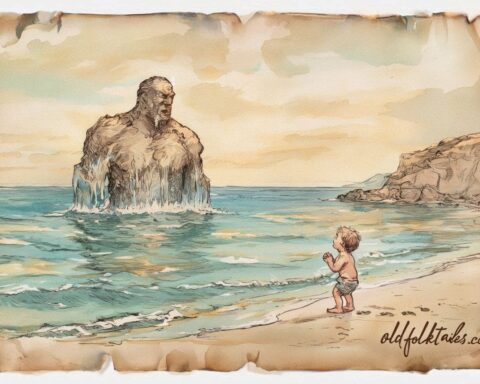In the days when the islands of Kiribati were young, Tarawa shimmered under the endless Pacific sun. The people lived by the rhythm of the tides, planting, fishing, and sharing the fruits of the land. But peace began to fade when a powerful chief rose to rule. His name was Chief Nabae, and though he was strong and rich, his heart was filled with greed.
Chief Nabae built great storehouses by the lagoon and filled them with breadfruit, coconuts, and fish. He claimed the best catches for himself, ordering his men to gather the people’s harvest while giving little in return. Soon, families went hungry, and the laughter of the island grew quiet.
Among those who suffered was a woman named Nei Angin, known for her intelligence and her calm spirit. Though she had no wealth, she was respected for her wisdom. She watched as the people weakened and decided that the island could no longer endure such injustice.
One evening, when the sun had slipped into the sea and the stars began to shine, Nei Angin went to the meeting house where the chief sat feasting. She carried nothing in her hands but the truth in her heart.
“Great Chief,” she said with a bow, “you are strong and mighty, yet your people grow thin. Tell me, what kind of tree grows tall when the roots are dying?”
The chief frowned. “You speak in riddles, woman.”
She smiled. “Perhaps. But answer me, and I shall leave in peace.”
Nabae laughed, thinking her words were foolish. “No tree grows when its roots are dying. It will fall and rot.”
“Then look to your island,” said Nei Angin softly. “For you are the tree, and your people are the roots.”
The men in the house murmured, and the chief’s laughter faded. Still, pride held him silent. Nei Angin left that night with the stars glimmering above her and a plan forming in her mind.
The next day, she gathered the women of Tarawa and whispered her idea. They worked quietly, moving before dawn and after sunset. When the men of the chief came to collect their food, the women gave them baskets that seemed full but were cleverly packed with shells at the bottom and only a thin layer of food on top.
Soon, the chief’s storerooms looked full, but the food was vanishing faster than he expected. His men grew suspicious, and he ordered a great feast to show off his wealth. The people were forced to attend, though their bellies were empty.
When the day came, Nei Angin stood before the crowd and said, “Great Chief, if you are as wise as you are strong, perhaps you will answer a few riddles. Should you fail, let the people eat freely once more.”
The chief agreed, laughing loudly. “I will answer any question you have. No woman can outwit me.”
Nei Angin nodded and began. “What walks without feet, speaks without a mouth, and feeds all who listen?”
The crowd whispered among themselves. The chief thought for a long time but could not answer. “Tell me what it is,” he demanded.
“It is the wind,” said Nei Angin. “It walks across the land and sea, speaks through the trees, and carries the smell of food to those who hunger.”
The people clapped and laughed quietly. The chief frowned but waved her to continue.
Her second riddle was harder still. “What grows by giving away, and dies when kept?”
Chief Nabae thought again, his pride burning. “I have heard many riddles, but this I do not know.”
“It is generosity,” said Nei Angin. “A gift that lives only when shared.”
The people cheered, and even the chief’s guards could not hide their smiles. The chief’s face darkened like a storm.
Nei Angin asked one last question. “What lives in every man, yet cannot be ruled by any chief?”
The chief rose, angry now. “Enough of your foolishness! What is this thing?”
Nei Angin met his gaze and said, “It is the heart.”
The people shouted in agreement. “Yes, the heart cannot be ruled!”
Chief Nabae realized that his greed had turned the hearts of his people against him. The truth struck him harder than any blow. He looked out at the crowd the faces of the hungry, the tired, and the brave and knew he had been defeated not by strength, but by wisdom.
Slowly, he raised his hands and declared, “From this day, the stores are open. Let every family take what they need. The island shall eat as one again.”
The people rejoiced. Food was shared, fires burned bright, and laughter returned to the island. Nei Angin was honored as the wise woman of Tarawa, the one who defeated greed with riddles and courage.
Years later, mothers still told their daughters her story. They said, “Be like Nei Angin, who used her mind to bring justice and her heart to heal the land.”
When storms rolled over Tarawa, the people said the wind carried her voice, whispering her first riddle again, “What kind of tree grows tall when the roots are dying?” reminding all that no ruler can thrive without caring for their people.
Moral Lesson:
The Clever Woman of Tarawa teaches that wisdom and truth are stronger than greed and power. Justice begins with courage, and the greatest strength lies in compassion and intelligence, not force.
Knowledge Check:
1. Who was the main character in the story?
Nei Angin, a wise and courageous woman of Tarawa.
2. What problem did the island face under Chief Nabae?
He hoarded food and caused his people to starve.
3. How did Nei Angin challenge the chief’s power?
She used clever riddles to expose his greed and teach wisdom.
4. What was the meaning of the first riddle about the tree?
That a leader cannot thrive when the people suffer.
5. What lesson did the chief learn in the end?
That generosity and fairness keep a community strong.
6. What is the main moral of the story?
Wisdom and justice bring peace where greed causes suffering.
Source: Adapted from Stories of Tarawa and Other Islands by the Kiribati Cultural Documentation Program (2011).
Cultural Origin: Kiribati (Micronesia)












